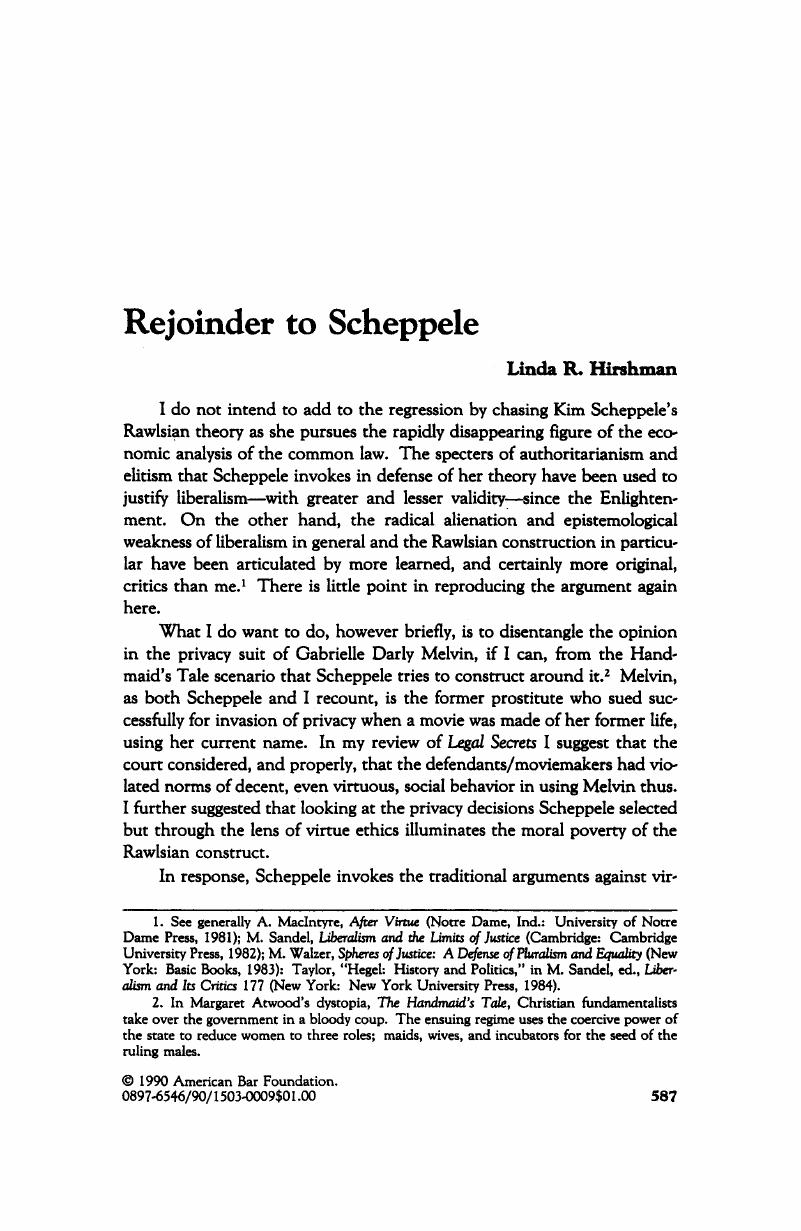No CrossRef data available.
Article contents
Rejoinder to Scheppele
Published online by Cambridge University Press: 27 December 2018
Abstract

- Type
- Review Essay
- Information
- Copyright
- Copyright © American Bar Foundation, 1990
References
1 See generally MacIntyre, A., After Virtue (Notre Dame, Ind.: University of Notre Dame Press, 1981); M. Sandel, Liberalism and the Limits of Justice (Cambridge: Cambridge University Press, 1982); M. Walzer, Spheres of Justice: A Defense of Pluralism and Equality (New York: Basic Books, 1983): Taylor, “Hegel: History and Politics,” in M. Sandel. ed., Liberalism and Its Critics 177 (New York: New York University Press, 1984).Google Scholar
2 In Margaret Atwood's dystopia, The Handmaid's Tale, Christian fundamentalists take over the government in a bloody coup. The ensuing regime uses the coercive power of the state to reduce women to three roles; maids, wives, and incubators for the seed of the ruling males.Google Scholar
3 . Scheppele, K., “The High Cost of Virtue,” 15 Law & Soc. Inquiry 575, 579 (1990).CrossRefGoogle Scholar
4 These categories are called actionable per se and include, for instance, criminal offense or loathsome disease.Google Scholar
5 . Gertz v. Robert Welch, Inc., 418 U.S. 323 (1974).Google Scholar
6 . See Hirshman, Linda, “Speaking Prose All Along: Scheppele's Legal Secrets ,” 15 Law & Soc. Inquiry 575, 569–70 (1990).Google Scholar
7 Harmetz, “2 Women Succeed as Producers, But Easy Street Is Down the Road,” N.Y. Times, 14 Sept. 1988, at sec. C. p. 8, col. 4 (city ed.); Michaelson, “Women and Media Too Little Power,” L.A. Times, 1 March 1988, at 1, col. 5 (home ed.).Google Scholar
8 . Myra Bradwell was the unassailably “uppity” woman who tried prematurely to become a member of the Illinois Bar. Bradwell v. Illinois, 83 U.S. (16 Wall) 130 (1873).Google Scholar
9 . Hirshman, , 15 Law B Soc. Inquiry at 567.Google Scholar
10 . 419 U.S.—(1989).Google Scholar
11 . Hirshman, , 15 Law & Soc. Inquiry at 564; Scheppele, 15 Law & Soc. Inquiry at 584.Google Scholar
12 . Scheppele, 15 Law & Soc. Inquiry at 585.Google Scholar
13 Id. at 576.Google Scholar
14 Nussbaum, M., The Fragility of Goodness 240–63 (1986); Pangle, T. & Tarcov, N., “Epilogue,” in Strauss, L. & Cropsey, J., eds., History of Political Philosophy 932 (3d ed. Chicago: University of Chicago Press, 1987).Google Scholar
15 See Wood, Q., “Classical Republicanism and the American Revolution,” Chi-Kent L Rev. (1990) (Symposium on Classical Philosophy and the American Constitutional Order, forthcoming).Google Scholar


